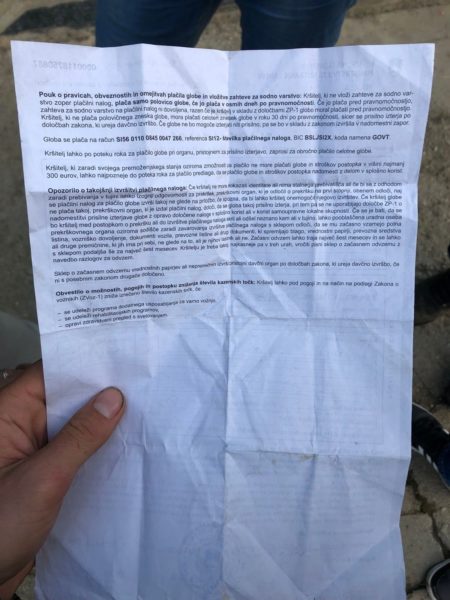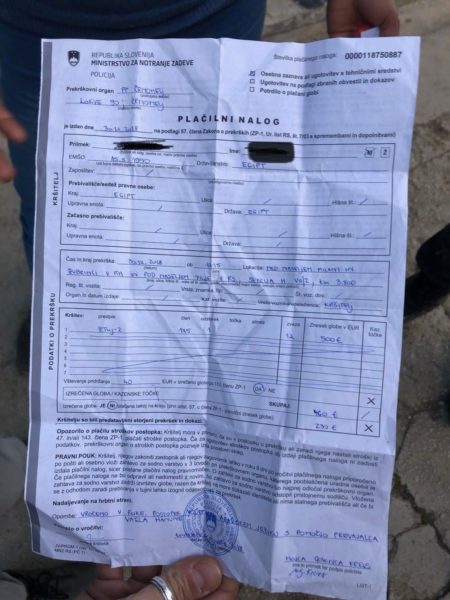On the 30th of December 2018, a group of 8 people-on-the-move were chain pushed back from Serbia to Croatia, then from Croatia directly further to Bosnia. They are from Syria, Iran, Algeria, Egypt, Sudan and Eritrea.
The group of seven left Velika Kladuša (BIH) on the January 23, 2019, and crossed the Croatian border with the intention of continuing to Slovenia. With them was a five-months pregnant woman and a 17-year-old minor. They walked for nine days through the forests, facing terribly cold weather, before reaching Slovenia. They crossed into Slovenia and continued approximately three kilometers further, up a mountain, before they were approached by a group of four Slovenian officers. Three of them were male, one female and a black dog was with them.
After the group was apprehended by the officers, they were led approximately two kilometers down the mountain where more officers were waiting with some police cars.
“There was three police cars, medium size.”
When they arrived there, all their belongings were searched and shortly after, a police van arrived. They later watched their bags being thrown into the trash at the police station and never returned. Further, more than €400 was taken from them as well as their extra clothes and two power banks. These non−cash items were also thrown into the trash together with their bags.
“They took our bags and threw them into the rubbish.”
One of the individuals was then taken by two officers with a car back to the river which they had crossed to enter Slovenia. The respondents believe that they took this specific individual because he was the only one speaking English and the officers wanted to find out the exact spot of crossing.
“From where [did] you cross?”
The individual explained that he was not able to tell them the location because after crossing over the nearby mountain, and then returning with the police car, he had lost track of his direction. As a response, one of the Slovenian officers kicked him.
“[He] kicked me, two times. After three kicks, he told me ‘lf you lie [to] us, l kick you another time.’”
This officer was tall, approximately 185 cm, with short hair and a clean shaved face, the individual called to mind. The other officer present tried to calm down his colleague at this point:
“The other police officer told him “Okay, okay’.”
The individual was then driven back to the group and all seven had to enter the windowless van to be driven to a police station.
After a 30-minute drive, they arrived at the police station and were taken to a small room, one by one, and interviewed by a translator. They were further told to sign papers and to explain the reason for their presence in Slovenia:
“One at a time, you write your name, take right index fingerprint, take picture, and then take you inside a small office room, after we finish talking, everyone is given a paper that they need to sign”
Each of them was given a bracelet to wear after this process with a number on it. According to the respondents, a Palestinian translator arrived to the station approximately 30 minutes after they did. He stayed for around two hours, till around 1 and 3 pm.
One of the respondents expressed confusion and frustration in the way they were forced to interact with the translator. According to him, when they spoke to the translator, it was without the presence of an officer and the translator acted as if he himself was an officer:
“He did not behave like a translator, He acted like a police officer. [He] asked me like police, not like a translator…He asked me alone .”
The translator first asked, from which country he was from and why he came to Slovenia.
“He told me ‘Okay, so why do you come here?’ and l told him ‘Because l need asylum here‘ and he answered ‘Why don’t you apply asylum in Greece or Serbia, Bosnia, Macedonia?‘.”
Later the translator asked the respondent how he knew about Slovenia to which the respondent answered that he had heard about Slovenia in Bosnia:
“He told me ‘No! Many people here are liars, they come and then they go. You come, tell me the truth, where do you want to go? Which country? Do you want to go to Holland? To Germany? Where do you want to go?’ He searched my phone…and he read my messages.”
The translator made the seven individuals open their phones and put in the codes, so he could read through their messages and contacts, telling them:
“l want to see what you have.”
Several of them had Slovenian SIM cards, and he was particularly interested in finding out where they had obtained these from.
At the end of the interview, all seven of them were given a paper (see photo). Nonetheless, later in Croatia, these papers would be taken again from the majority of them and not given back.
All individuals asked for asylum in Slovenia during their interviews and were told consistently that they would not be able to receive asylum because:
“You people, you always run.”
After around three hours at this police station, they were moved to another police station.
“We went to another police station and we slept there, they gave us food and then in the morning they gave us food again.”
“After [we left the first police station] we didn’t see any way that the car goes because [they] closed up the car. Because you don’t have windows, you see nothing, until the police station.”
Each two of them were kept together in a cell during the night with a small non-opening window, a toilet, a wooden bed, and a camera.
“It looked like a jail.”
At 9 am the next morning, they were driven to the Croatian border together with an Iranian person. They arrived at the border at around 12 pm and had to stay at a border station for the majority of the day. At this station, they were told to sign several papers written in Croatian, a language none of them understood and no translator was present.
When the group was handed over to the Croatian authorities at the border check point, one of the latter officers asked one of the former officers who of the individuals could speak English. The Croatian officer then informed this individual:
“Now you came in to Croatia, we don’t want to harm you…we only take some information from you after that you go back.”
At the end, the respondent reported that the officers wanted to assure the group that they would not harm them. After this, they were taken to an office within the border station where everyone was asked for their names and photos were taken. They were also made to sign papers which had their personal details and information on it. They again didn’t understand what they signed and again no translators were present.
Later, at around 9 pm, the group of now eight, had to enter another van and was driven to the Bosnian−Croatian border, where they arrived at around 11 pm. At the border, they discovered three male Croatian officers with stars on their shoulders. One had three stars one had two, and the other one only one star. Aside from this, the respondents also recalled seeing two female officers at the push-back site, who remained in some distance in a small car. The group was taken out of the van and told:
“From here, Velika Kladuša is five kilometers, you go!”.
Before their push-back, the officer with the three stars on his shoulder told them that they would not beat the group:
“l know which problems you have and why you come here, so no problem.”
The people on the move were surprised that they did not encounter any violence during their push-back:
“Maybe [because it was] the New Year, they did not harm us, nothing or because three people [in our group were] old people.”
The group was pushed-back around 11.30 pm on December 31, 2019. It was New Years Eve and when they walked back to Velika Kladuša, they began to hear firework celebrations.
“When we reach there, the New Year celebrations started.”


